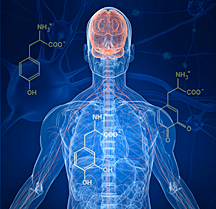- Number 317 |
- August 2, 2010
Even cells make remodeling mistakes

Two post-translational modifications
mediated by hydroxyl radical on
protein tyrosine residue serve as
novel markers of oxidative stress.
When certain cells are stressed by too many reactive oxygen species hanging around, they tack that oxygen onto the protein tyrosine which damages the cell, according to DOE’s Pacific Northwest National Laboratory and UCLA School of Medicine. The team discovered that the protein tyrosine in heart and brain tissues was oxidized to create DOPA and dopaquinone. These modified proteins disrupt the cellular machinery, causing early cell death in heart tissue and mixing up signals in the brain. These modified proteins may provide valuable data about the progression of heart disease and neurological diseases, like Parkinson's. Also, the study’s detailed results may help establish more sensitive tests for earlier detection and treatment of diseases. This research used the world-class proteomics capabilities at DOE’s EMSL.
[Kristin Manke, 509.372.6011
kristin.manke@pnl.gov]
